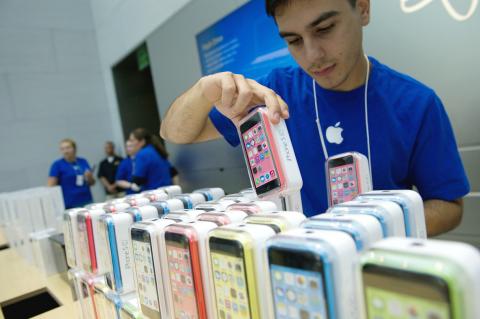Catcher Technology Co (可成科技), which makes metal casings for Apple Inc’s MacBook Air notebook and iPad mini tablet, is likely to receive new smartphone orders early next year, Barclays Capital Securities Taiwan Ltd said.
The new orders will be for Apple’s new iPhone 5S and Samsung Electronics Co’s premium Galaxy series during the first half of next year, Barclays analysts led by Dale Gai (蓋欣山) and Kirk Yang (楊應超) said in a note released on Thursday.
Catcher, which also supplies metal casings for HTC Corp’s (宏達電) smartphones, is likely to benefit from the growing trend of leading smartphone vendors adopting metal casings in their phones. So far, Samsung is the only top-five smartphone brand which is not using metal casing for its products.

Photo: Bloomberg
However, that could change. South Korea’s Electronic Times newspaper reported on Aug. 30 that Samsung might build a production line at its plant in Gumi, about 260km southeast of Seoul, to produce handset casing from magnesium and aluminium by the end of this year. The world’s largest smartphone brand is likely to apply metal casing to its premium models set to be released early next year, according to a report on the paper’s Web site.
In their note, Barclays analysts said that based on their checks with supply chain companies,
Samsung is close to a final decision on the adoption of metal casings in at least one of its high-end smartphone models from the second quarter next year.
“Our checks suggest Catcher has been qualified as one of the major sources on the total metal casing smartphone volumes at 10 [million to] 30 million next year from Samsung,” the analysts wrote.
“The final order allocation is to be confirmed in early first quarter 2014, subject to price bids by approved vendors,” they added.
Pauline Chen (陳柏齡), an analyst at Credit Suisse AG’s Taipei securities branch, said in a note to her clients on Sept. 4 that if Samsung decides to use metal casing for its flagship model next year, it is very likely to outsource some orders to non-South Korean suppliers in order to meet the requirements for volume and quality.
Chen said Catcher could also gain more orders from Apple next year as the US company is likely to adopt a new strategy to add new electronics manufacturing service (EMS) providers, including Wistron Corp (緯創) and Inventec Corp (英業達), to reduce risks for new products.
“We believe that the news should be positive for independent metal casing suppliers such as Catcher or Ju Teng International Holdings Ltd (巨騰) as these ‘new’ EMS suppliers could prefer to team up with independent casing makers, over their competitors’ casing subsidiaries,” she wrote.
Moreover, Catcher’s increased iPhone orders could help it offset the order losses from HTC, according to Barclays analysts, who predicted a 20 percent annual sales decline for HTC next year from this year.
“The increasing likelihood that Catcher will see iPhone 5S order gains in the first half of 2014 will likely completely offset HTC-related risks,” they said.
Shares of Catcher closed at NT$155 on Wednesday. Barclays reiterated its “overweight” rating on the company’s shares, with a target price of NT$179.

In Italy’s storied gold-making hubs, jewelers are reworking their designs to trim gold content as they race to blunt the effect of record prices and appeal to shoppers watching their budgets. Gold prices hit a record high on Thursday, surging near US$5,600 an ounce, more than double a year ago as geopolitical concerns and jitters over trade pushed investors toward the safe-haven asset. The rally is putting undue pressure on small artisans as they face mounting demands from customers, including international brands, to produce cheaper items, from signature pieces to wedding rings, according to interviews with four independent jewelers in Italy’s main

Japanese Prime Minister Sanae Takaichi has talked up the benefits of a weaker yen in a campaign speech, adopting a tone at odds with her finance ministry, which has refused to rule out any options to counter excessive foreign exchange volatility. Takaichi later softened her stance, saying she did not have a preference for the yen’s direction. “People say the weak yen is bad right now, but for export industries, it’s a major opportunity,” Takaichi said on Saturday at a rally for Liberal Democratic Party candidate Daishiro Yamagiwa in Kanagawa Prefecture ahead of a snap election on Sunday. “Whether it’s selling food or

CONCERNS: Tech companies investing in AI businesses that purchase their products have raised questions among investors that they are artificially propping up demand Nvidia Corp chief executive officer Jensen Huang (黃仁勳) on Saturday said that the company would be participating in OpenAI’s latest funding round, describing it as potentially “the largest investment we’ve ever made.” “We will invest a great deal of money,” Huang told reporters while visiting Taipei. “I believe in OpenAI. The work that they do is incredible. They’re one of the most consequential companies of our time.” Huang did not say exactly how much Nvidia might contribute, but described the investment as “huge.” “Let Sam announce how much he’s going to raise — it’s for him to decide,” Huang said, referring to OpenAI

The global server market is expected to grow 12.8 percent annually this year, with artificial intelligence (AI) servers projected to account for 16.5 percent, driven by continued investment in AI infrastructure by major cloud service providers (CSPs), market researcher TrendForce Corp (集邦科技) said yesterday. Global AI server shipments this year are expected to increase 28 percent year-on-year to more than 2.7 million units, driven by sustained demand from CSPs and government sovereign cloud projects, TrendForce analyst Frank Kung (龔明德) told the Taipei Times. Demand for GPU-based AI servers, including Nvidia Corp’s GB and Vera Rubin rack systems, is expected to remain high,